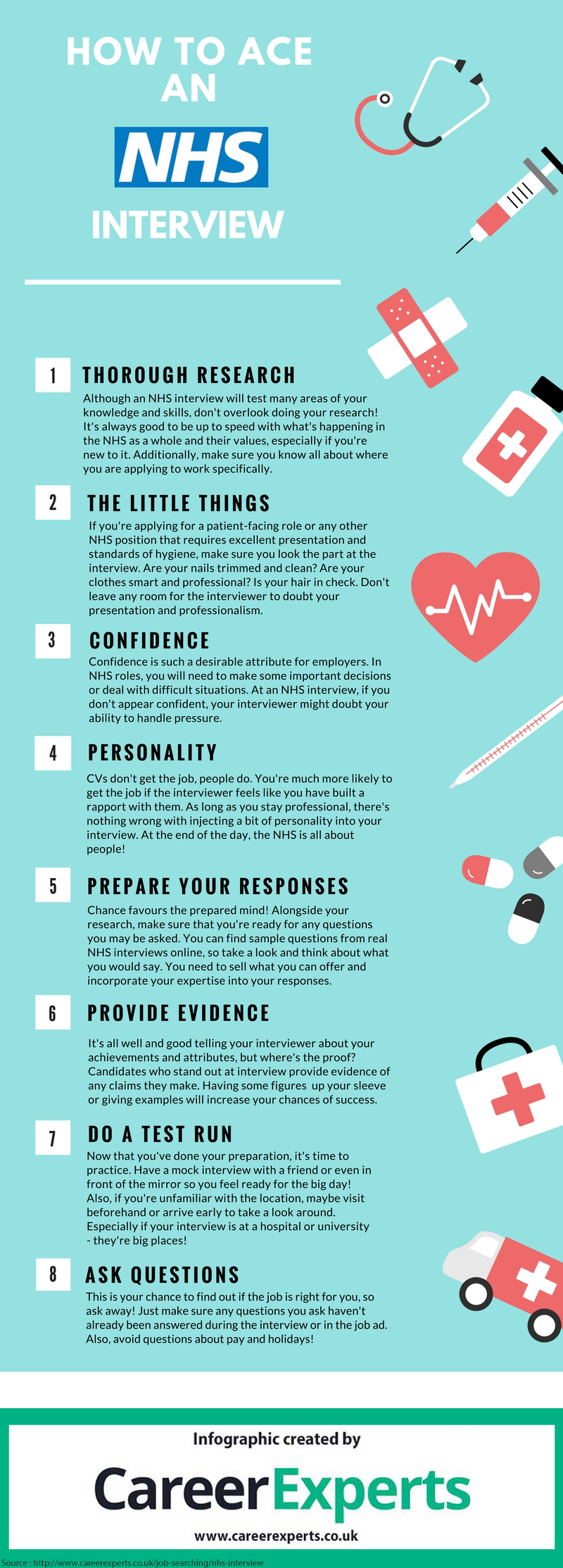The NHS currently employs over 1.6 million people and is one of the world’s largest organisations. There are over 350 different careers on offer, and with 49% of the NHS workforce employed in a non-medical or non-clinical career, the NHS is much more than doctors and nurses.
From IT contractors to medical secretaries, there is undoubtedly a position in the NHS that requires some of the talents and skills you have. Once you’ve found a role you think you’re suited to and submitted your application, you might be successful enough to secure an interview.
Interviews can always be a daunting prospect, but our guide to acing an NHS interview will help you make a great impression and show your interviewers that you’re right for the job.

Preparation is the key to a successful NHS interview
For any interview, whether it’s for the NHS or otherwise, preparation is the key to showing a potential employer that you are well-researched and ready to work for their organisation. Demonstrating an understanding of the position and its responsibilities will show that you’re an organised candidate and eager to embrace your duties.
Remember, the better prepared you are for your interview, the more confident you will feel and the more success you will have.
The little details matter
Preparation also extends to making sure you have an appropriate outfit for your interview and you’ve checked where you will need to travel to. Small details like this can often be forgotten, but wearing the wrong thing or being late can leave your interviewer with a bad impression of you. Double check your travel arrangements, including where to park if you choose to drive, and make sure you have your interview attire ready as early as possible so you’re not left with a last-minute rush.
Give a confident performance
It can often be tempting to over talk in an interview, and when nerves take control it’s easy to get carried away and babble. Focus on giving concise answers, highlighting why you would be the right candidate for the role and giving detailed examples of where you’ve used your skills. Taking a few moments to think of a response is also perfectly acceptable, and interviewers would rather you were honest if you don’t understand or know the answer, than babble and give off a nervous impression.
Also never assume those on your interview panel are familiar with your CV and application form, you may be asked to expand or explain positions and responsibilities you’ve held previously. Your NHS interview is your chance to emphasise why you’re the right person for the role and to give clear examples of where you’ve performed well and taken on responsibility.
Ensure your interview is a conversation, not a monologue
Remember that your NHS interview is also a two-way process and an opportunity to ask any questions about the role or the trust you could be working for. Be careful not to ask questions that may have already been answered in the job description. However, asking about progression opportunities and the working culture is okay, and it will allow your interviewer(s) to expand on what your day-to-day life will be like.
Your interview is also a chance for you to show your personality. The NHS has a Values Based Recruitment policy, which allows your interviewer to focus on your attributes, how you would fit in, and your understanding of its culture and values.
Positive body language is key
One of the best ways to appear confident is to keep your body language open and positive. This includes not folding your arms which can appear defensive. Instead, focus on smiling and making eye contact with those asking the questions.
Don’t forget to keep this up when your NHS interview finishes. Thank your interviewer for their time and say you look forward to hearing from them. Don’t let the final moments of your interview let you down after a confident performance.
Gather feedback to help you next time
Sometimes you won’t be successful in an interview, and whilst that can be hard to hear it’s important to ask for feedback to help you improve for next time.
Sometimes you might not have been successful due to another candidate having more experience or expertise in a chosen field, but it’s good practice to have some points to work on and make sure you perform even better next time.
NHS interviews are known to be difficult
Working in the NHS offers a rewarding career and many benefits, and there are many people who want to work for an organisation like this.
There are hundreds of applicants for roles in the NHS, so you’ll have lots of competition. That’s why, to be successful in your job hunt, it’s important to establish yourself as a viable candidate through a strong application, and follow that up with a confident interview.
Niamh Spence writes for GoToJobBoard, a dedicated job board which specialises in non-clinical and non-medical roles within the NHS and can help candidates to successfully find their perfect role in the NHS.
